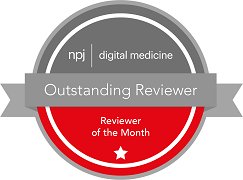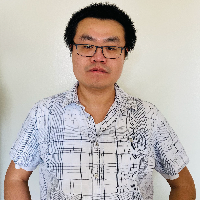Reviewer of the Month
 Each month our editors will select one of our outstanding referees to be featured as Reviewer of the Month.
Each month our editors will select one of our outstanding referees to be featured as Reviewer of the Month.
Our featured reviewers are those who have:
- made a significant and positive contribution to the peer review process, regardless of whether the paper was eventually accepted by the journal;
- taken both a broad and detailed view of the paper;
- demonstrated professionalism and compassion in their reviews; and
- provided comments that truly help the authors to improve their work.
We must note that, while it is our opinion that these referees have provided exceptional reviews, many of our referees meet the above criteria and we regret that we cannot recognize each of them publicly here. We are equally grateful to all of the individuals who agree to review for npj Digital Medicine, thereby helping to strengthen the scientific record. We hope that by highlighting a few of our most outstanding referees, we can bring attention to the valuable contributions of peer reviewers to the scientific process.
If you are interested in reviewing for the journal regularly, reviewing 3-5 new submissions per year, please consider applying to join our team of Editorial Board Members using our online form.
September 2023
Scott Fleming Scott Fleming is a PhD student and research assistant in the Department of Biomedical Data Science at Stanford University. His research focuses on artificial intelligence methods to support clinical decision making under uncertainty. Scott's work incorporates ideas from causal inference, reinforcement learning, natural language processing, and has appeared in leading digital health, artificial intelligence, and medical informatics venues such as npj Digital Medicine, JAMIA, and NeurIPS. Scott completed a MS in Computer Science and a BS in Mathematical and Computational Science degrees at Stanford University and was a National Defense Science and Engineering Graduate (NDSEG) Fellowship recipient. He is advised by Professors Nigam Shah (Medicine) and Emma Brunskill (Computer Science). You can follow him on Twitter @_scott_fleming.
Scott Fleming is a PhD student and research assistant in the Department of Biomedical Data Science at Stanford University. His research focuses on artificial intelligence methods to support clinical decision making under uncertainty. Scott's work incorporates ideas from causal inference, reinforcement learning, natural language processing, and has appeared in leading digital health, artificial intelligence, and medical informatics venues such as npj Digital Medicine, JAMIA, and NeurIPS. Scott completed a MS in Computer Science and a BS in Mathematical and Computational Science degrees at Stanford University and was a National Defense Science and Engineering Graduate (NDSEG) Fellowship recipient. He is advised by Professors Nigam Shah (Medicine) and Emma Brunskill (Computer Science). You can follow him on Twitter @_scott_fleming.
On the importance of being a peer reviewer, Scott comments: "Peer review is both a privilege and a responsibility. I've seen my own work improve tremendously in response to thoughtful peer reviews. Peer reviewing for npj Digital Medicine is a unique opportunity to give back and support other researchers working at the intersection of digital technology, artificial intelligence, and medicine. Reviewing the high quality articles submitted to npj Digital Medicine also helps improve my own understanding of the field and stay up to date on impactful research."
August 2023
Leo Anthony Celi, MD, MPH, MSc
 Dr. Leo Anthony Celi is currently the Clinical Research Director and Principal Research Scientist at the Laboratory for Computational Physiology at MIT and a practicing intensivist at the Beth Israel Deaconess Medical Center in Boston, Dr. Celi’s work focuses on scaling clinical research to be more inclusive through open access data and software, particularly for limited resource settings; identifying bias in the data to prevent them from being encrypted in models and algorithms; and redesigning research using the principles of team science and the hive learning strategy.Dr. Celi completed his medical degree at the University of the Philippines, followed by postgraduate training in internal medicine, critical care medicine, infectious diseases and biomedical informatics at Cleveland Clinic, Harvard, Stanford and MIT. He has published numerous papers in machine learning not just in critical care medicine but across different specialties such as ophthalmology, radiology, surgery, nursing, bioethics, among others.
Dr. Leo Anthony Celi is currently the Clinical Research Director and Principal Research Scientist at the Laboratory for Computational Physiology at MIT and a practicing intensivist at the Beth Israel Deaconess Medical Center in Boston, Dr. Celi’s work focuses on scaling clinical research to be more inclusive through open access data and software, particularly for limited resource settings; identifying bias in the data to prevent them from being encrypted in models and algorithms; and redesigning research using the principles of team science and the hive learning strategy.Dr. Celi completed his medical degree at the University of the Philippines, followed by postgraduate training in internal medicine, critical care medicine, infectious diseases and biomedical informatics at Cleveland Clinic, Harvard, Stanford and MIT. He has published numerous papers in machine learning not just in critical care medicine but across different specialties such as ophthalmology, radiology, surgery, nursing, bioethics, among others.
On the importance of being a peer reviewer Dr, Celi comments: "Peer review of journal submissions is an excellent opportunity is not leveraged enough in my opinion. Reviews of journal submissions would make excellent homework/exercise for students. We need to rethink the peer review process to make it more effective and inclusive."
July 2023
Yanjun Gao, PhD Dr. Yanjun Gao is a Postdoctoral Research Associate at the Critical Care Unit (ICU) Data Science Lab in the Department of Medicine, School of Medicine and Public Health, University of Wisconsin-Madison. She obtained her Ph.D. in Computer Science and Engineering from Pennsylvania State University, specializing in Natural Language Processing (NLP) and Artificial Intelligence (AI). Having previously focused on AI-enhanced classroom technology, her current research revolves around developing and evaluating NLP models for diagnostic decision-support systems. She utilizes clinical notes and medical knowledge base to achieve AI diagnostic reasoning. Dr. Gao is actively involved in publishing research and serving as a reviewer for leading NLP conferences and medical informatics journals such as ACL, COLING, JAMIA and JBI. You can follow her on Twitter @Serena_pancakes.
Dr. Yanjun Gao is a Postdoctoral Research Associate at the Critical Care Unit (ICU) Data Science Lab in the Department of Medicine, School of Medicine and Public Health, University of Wisconsin-Madison. She obtained her Ph.D. in Computer Science and Engineering from Pennsylvania State University, specializing in Natural Language Processing (NLP) and Artificial Intelligence (AI). Having previously focused on AI-enhanced classroom technology, her current research revolves around developing and evaluating NLP models for diagnostic decision-support systems. She utilizes clinical notes and medical knowledge base to achieve AI diagnostic reasoning. Dr. Gao is actively involved in publishing research and serving as a reviewer for leading NLP conferences and medical informatics journals such as ACL, COLING, JAMIA and JBI. You can follow her on Twitter @Serena_pancakes.
On why she chose to review for the journal, Yanjun comments: "As a researcher with experience in cross-disciplinary research, I deeply value npj Digital Medicine's dedication to pushing the boundaries of interdisciplinary studies in medicine. Reviewing the manuscripts submitted to the journal brings me great satisfaction, as they exemplify the promising potential of digital healthcare in shaping the future of medicine. Serving as a peer reviewer for the journal allows me to contribute to the academic community and support the endeavors of fellow researchers."
June 2023
Karandeep Singh, MD, MMSc Karandeep Singh is an Assistant Professor of Learning Health Sciences, Internal Medicine, Urology, and Information at the University of Michigan. He directs the Machine Learning for Learning Health Systems (ML4LHS) Lab, which focuses on translational issues related to the implementation of machine learning models within health systems. He serves as an Associate Chief Medical Information Officer of Artificial Intelligence for Michigan Medicine and is the Associate Director for Implementation for Precision Health at the University of Michigan. He teaches a health data science course for graduate and doctoral students, and provides clinical care for people with kidney disease. He completed his internal medicine residency at UCLA Medical Center, where he served as chief resident, and a nephrology fellowship in the combined Brigham and Women’s Hospital/Massachusetts General Hospital program in Boston, MA. He completed his medical education at the University of Michigan Medical School and holds a master’s degree in medical sciences in Biomedical Informatics from Harvard Medical School. He is board certified in internal medicine, nephrology, and clinical informatics. You can follow him on Twitter @kdpsinghlab.
Karandeep Singh is an Assistant Professor of Learning Health Sciences, Internal Medicine, Urology, and Information at the University of Michigan. He directs the Machine Learning for Learning Health Systems (ML4LHS) Lab, which focuses on translational issues related to the implementation of machine learning models within health systems. He serves as an Associate Chief Medical Information Officer of Artificial Intelligence for Michigan Medicine and is the Associate Director for Implementation for Precision Health at the University of Michigan. He teaches a health data science course for graduate and doctoral students, and provides clinical care for people with kidney disease. He completed his internal medicine residency at UCLA Medical Center, where he served as chief resident, and a nephrology fellowship in the combined Brigham and Women’s Hospital/Massachusetts General Hospital program in Boston, MA. He completed his medical education at the University of Michigan Medical School and holds a master’s degree in medical sciences in Biomedical Informatics from Harvard Medical School. He is board certified in internal medicine, nephrology, and clinical informatics. You can follow him on Twitter @kdpsinghlab.
On why he chose to review for the journal, Karandeep comments: "With all the rapid innovations happening right now in the space of AI and large language models, it's more important than ever to separate hype from reality. Peer review provides an important way for scientists to support each other in making sure we think critically think about our work while laying a solid foundation for one another to build upon."
May 2023
Oishi Banerjee  Oishi Banerjee is a Research Assistant at the Department of Biomedical Informatics at Harvard Medical School and an incoming PhD student in Computer Science at Harvard University. She is passionate about applying AI to real-world medical problems, with the goal of making healthcare more efficient and accessible. Her interests include multimodal learning, clinician-AI collaboration, label-efficient learning (e.g. self-supervision), and computer vision techniques for medical image interpretation. Her research currently focuses on how foundation models, the latest generation of large, highly flexible AI models, can support patients and clinicians across a wide range of tasks. Her work has been published in venues including Nature and Nature Medicine. She has previously completed her BA degree in Classics and her MS degree in Computer Science at Stanford University.
Oishi Banerjee is a Research Assistant at the Department of Biomedical Informatics at Harvard Medical School and an incoming PhD student in Computer Science at Harvard University. She is passionate about applying AI to real-world medical problems, with the goal of making healthcare more efficient and accessible. Her interests include multimodal learning, clinician-AI collaboration, label-efficient learning (e.g. self-supervision), and computer vision techniques for medical image interpretation. Her research currently focuses on how foundation models, the latest generation of large, highly flexible AI models, can support patients and clinicians across a wide range of tasks. Her work has been published in venues including Nature and Nature Medicine. She has previously completed her BA degree in Classics and her MS degree in Computer Science at Stanford University.
On why she chose to review for the journal, Oishi comments: "I’ve genuinely enjoyed the chance to review research for npj Digital Medicine. Peer reviewers have a unique opportunity to contribute to the broader scientific community and to keep up with new developments in the field."
April 2023
Kirsten Bobrow, DPhil Kirsten Bobrow is an epidemiologist and Public Health and Preventive Medicine specialist with 8 years’ experience working in the public sector, including 6 years in local and state-level public health units and 10 years’ experience in clinical and applied public health research. She is an Atlantic Fellow for Global Brain Health Equity. Her research focuses on the use of technology to improve outcomes for people living with one or more chronic diseases, including hypertension and diabetes. She has led large pragmatic clinical trials to understand the role of health messaging delivery by a mobile device to improve treatment adherence in South Africa and Malawi. Her current research interests include developing and testing interventions to improve outcomes in people with multimorbidity, and improving access to epidemiological data on brain health in countries in Africa. She has experience developing public health policy and strategic priorities for programs; translating evidence into public health practice; managing programs and supervising teams; providing subject matter expertise and technical assistance to health services staff and managers; managing data analysis workflows from concept and analysis to interpretation, visualization, and dissemination to a variety of audiences. You can follow her on Twitter @dr_bobrow and on LinkedIn.
Kirsten Bobrow is an epidemiologist and Public Health and Preventive Medicine specialist with 8 years’ experience working in the public sector, including 6 years in local and state-level public health units and 10 years’ experience in clinical and applied public health research. She is an Atlantic Fellow for Global Brain Health Equity. Her research focuses on the use of technology to improve outcomes for people living with one or more chronic diseases, including hypertension and diabetes. She has led large pragmatic clinical trials to understand the role of health messaging delivery by a mobile device to improve treatment adherence in South Africa and Malawi. Her current research interests include developing and testing interventions to improve outcomes in people with multimorbidity, and improving access to epidemiological data on brain health in countries in Africa. She has experience developing public health policy and strategic priorities for programs; translating evidence into public health practice; managing programs and supervising teams; providing subject matter expertise and technical assistance to health services staff and managers; managing data analysis workflows from concept and analysis to interpretation, visualization, and dissemination to a variety of audiences. You can follow her on Twitter @dr_bobrow and on LinkedIn.
On why she chose to review for the journal, Dr. Bobrow comments: "Being a peer reviewer for npj Digital Medicine is a way for me to give back to the academic community and support the work of other researchers. It helps me stay up to date and enables me to use my subject matter expertise and contribute to the advancement of the field by ensuring that high-quality research is published. It also improves my submissions and writing, and informs my own work.”
March 2023
Zhanghexuan Ji
 Zhanghexuan Ji is a Ph.D. candidate and research assistant in the Department of Computer Science and Engineering at University at Buffalo, SUNY. Before that, he completed his M.S. and B.E. degrees in Biomedical Engineering at Northwestern University in 2018 and Southeast University, Nanjing, China in 2016, respectively. He is an AI/deep learning researcher and enthusiast with a strong passion in developing practical AI solutions for real world vision problems. His research interests span deep learning and its applications in computer vision, medical image analysis, and radiology. His specific deep learning methods cover label efficient learning (self-/weakly/semi-supervised learning), continual learning, multi-modality learning and transfer learning. Applications in computer vision and medical imaging include 3D CT/MRI organ and tumor segmentation, scribble-supervised intra-tumor segmentation, interactive organ segmentation, continual whole-body multi-organ segmentation, multimodality segmentation with missing modality, pathological cell segmentation and phenotyping, and vision-language representation model. This research has been accepted at MICCAI, ICLR and other conferences.
Zhanghexuan Ji is a Ph.D. candidate and research assistant in the Department of Computer Science and Engineering at University at Buffalo, SUNY. Before that, he completed his M.S. and B.E. degrees in Biomedical Engineering at Northwestern University in 2018 and Southeast University, Nanjing, China in 2016, respectively. He is an AI/deep learning researcher and enthusiast with a strong passion in developing practical AI solutions for real world vision problems. His research interests span deep learning and its applications in computer vision, medical image analysis, and radiology. His specific deep learning methods cover label efficient learning (self-/weakly/semi-supervised learning), continual learning, multi-modality learning and transfer learning. Applications in computer vision and medical imaging include 3D CT/MRI organ and tumor segmentation, scribble-supervised intra-tumor segmentation, interactive organ segmentation, continual whole-body multi-organ segmentation, multimodality segmentation with missing modality, pathological cell segmentation and phenotyping, and vision-language representation model. This research has been accepted at MICCAI, ICLR and other conferences.
On why he chose to review for the journal, Zhanghexuan comments: "As a researcher working on combining AI/deep learning methods with medical imaging, I like to serve as a reviewer for npj Digital Medicine and make contributions to medical society based on my expertise and research experience in this field. Being a reviewer also provides me an opportunity to follow the latest development of AI in medical problems."
February 2023
Justin Ko, MD, MBA
 Justin Ko is Clinical Professor and Chief of Medical Dermatology at Stanford University and spearheads the dermatology department's efforts around digital health, quality and value-based care. He is active in a number of leadership roles within Stanford Medicine including as an Associate Chief Quality Officer and physician lead of Patient Experience. His passion for innovating on models of care delivery drives his clinical and research efforts around layering advances in artificial intelligence on remote care capabilities to enhance access, quality and value of dermatologic care. He developed and runs a digital care delivery program at SHC, providing virtual visits for patients and remote consultations for referring clinicians. He conducts research on and engages in collaborations around interventions that layer advances in machine learning on digital health capabilities to enhance access, quality and value of dermatologic care and is a founder and leader of the Stanford Translational AI in Dermatology (TRAIND) group and is a founder and co-director of the Skin Innovation and Interventional Research Group (SIIRG) which conducts clinical and translational research on skin disease. He graduated magna cum laude from Harvard University and worked in investment banking; mergers and acquisitions at JP Morgan before going on to earn a combined medical and business degree at Tufts University. During medical school, he was a member of the Alpha Omega Alpha honor society. Justin then performed his residency at the Harvard Dermatology Residency Training Program where he served as chief resident.
Justin Ko is Clinical Professor and Chief of Medical Dermatology at Stanford University and spearheads the dermatology department's efforts around digital health, quality and value-based care. He is active in a number of leadership roles within Stanford Medicine including as an Associate Chief Quality Officer and physician lead of Patient Experience. His passion for innovating on models of care delivery drives his clinical and research efforts around layering advances in artificial intelligence on remote care capabilities to enhance access, quality and value of dermatologic care. He developed and runs a digital care delivery program at SHC, providing virtual visits for patients and remote consultations for referring clinicians. He conducts research on and engages in collaborations around interventions that layer advances in machine learning on digital health capabilities to enhance access, quality and value of dermatologic care and is a founder and leader of the Stanford Translational AI in Dermatology (TRAIND) group and is a founder and co-director of the Skin Innovation and Interventional Research Group (SIIRG) which conducts clinical and translational research on skin disease. He graduated magna cum laude from Harvard University and worked in investment banking; mergers and acquisitions at JP Morgan before going on to earn a combined medical and business degree at Tufts University. During medical school, he was a member of the Alpha Omega Alpha honor society. Justin then performed his residency at the Harvard Dermatology Residency Training Program where he served as chief resident.
On why he chose to review for the journal, Prof. Ko comments: "To serve as a peer reviewer for npj Digital Medicine is an incredibly valuable experience. It’s a fulfilling way of doing my part helping to ensure the rigor and quality of research around quickly-evolving areas like AI in medicine, in which I’m able to put my subject matter expertise and domain knowledge to use. The experience also helps make me a better researcher and communicator of my research and allows me to stay up to date and ahead of the curve with the advances in the field".
January 2023
Ranjay Krishna, PhD Ranjay Krishna is an Assistant Professor at the Paul G. Allen School of Computer Science & Engineering. His research lies at the intersection of computer vision and human computer interaction. This research has received best paper, outstanding paper, and orals at CVPR, ACL, CSCW, NeurIPS, UIST, and ECCV, and has been reported by Science, Forbes, the Wall Street Journal, and PBS NOVA. His research has been supported by Google, Amazon, Cisco, Toyota Research Institute, NSF, ONR, and Yahoo. He holds a bachelor's degree in Electrical & Computer Engineering and in Computer Science from Cornell University, a master's degree in Computer Science from Stanford University and a Ph.D. in Computer Science from Stanford University.You can follow him on Twitter @ranjaykrishna and read more about his research on his website.
Ranjay Krishna is an Assistant Professor at the Paul G. Allen School of Computer Science & Engineering. His research lies at the intersection of computer vision and human computer interaction. This research has received best paper, outstanding paper, and orals at CVPR, ACL, CSCW, NeurIPS, UIST, and ECCV, and has been reported by Science, Forbes, the Wall Street Journal, and PBS NOVA. His research has been supported by Google, Amazon, Cisco, Toyota Research Institute, NSF, ONR, and Yahoo. He holds a bachelor's degree in Electrical & Computer Engineering and in Computer Science from Cornell University, a master's degree in Computer Science from Stanford University and a Ph.D. in Computer Science from Stanford University.You can follow him on Twitter @ranjaykrishna and read more about his research on his website.
On why he chose to review for the journal, Dr. Krishna comments: "As a scientist working in computer vision, I am invested in how computer vision methods are applied to healthcare applications. Being a peer reviewer is one of the services that allows me to contribute".
December 2022
Hilary Weingarden, PhD
 Dr. Weingarden is a psychologist and the Assistant Director of the Center for Digital Mental Health at Massachusetts General Hospital (MGH) and an assistant professor at Harvard Medical School. Dr. Weingarden conducts research focused on leveraging technology to enhance the assessment and treatment of psychiatric illnesses. She is currently PI of an NIMH-funded K23 award that aims to use passive smartphone sensor data to develop and validate digital biomarkers of high-risk emotion states in body dysmorphic disorder, and to use digital biomarkers of negative emotion states to predict acute changes in suicidal ideation and substance use over time. She is also co-Investigator on several investigator-initiated industry collaborations to develop and test smartphone-delivered CBT for psychiatric disorders and has led related projects to particularly understand engagement with smartphone CBT. Dr. Weingarden has received research recognitions including a Rising Star Award from the Association for Psychological Science, runner up for the Anxiety and Depression Association of America’s Donald F. Klein Early Career Investigator Award, two postdoctoral fellowship awards from Harvard University, and a pre-doctoral NRSA (F31) from NIMH. You can follow her on Twitter @HilWeingarden. On reviewing for the journal, Dr. Weingarden comments that "npj Digital Medicine is a leading journal in digital health research. I hope to contribute to the growth of this field and see it continue to advance."
Dr. Weingarden is a psychologist and the Assistant Director of the Center for Digital Mental Health at Massachusetts General Hospital (MGH) and an assistant professor at Harvard Medical School. Dr. Weingarden conducts research focused on leveraging technology to enhance the assessment and treatment of psychiatric illnesses. She is currently PI of an NIMH-funded K23 award that aims to use passive smartphone sensor data to develop and validate digital biomarkers of high-risk emotion states in body dysmorphic disorder, and to use digital biomarkers of negative emotion states to predict acute changes in suicidal ideation and substance use over time. She is also co-Investigator on several investigator-initiated industry collaborations to develop and test smartphone-delivered CBT for psychiatric disorders and has led related projects to particularly understand engagement with smartphone CBT. Dr. Weingarden has received research recognitions including a Rising Star Award from the Association for Psychological Science, runner up for the Anxiety and Depression Association of America’s Donald F. Klein Early Career Investigator Award, two postdoctoral fellowship awards from Harvard University, and a pre-doctoral NRSA (F31) from NIMH. You can follow her on Twitter @HilWeingarden. On reviewing for the journal, Dr. Weingarden comments that "npj Digital Medicine is a leading journal in digital health research. I hope to contribute to the growth of this field and see it continue to advance."
November 2022
Husham Sharifi, MD
 Husham Sharifi is a Clinical Assistant Professor in the Division of Pulmonary, Allergy, and Critical Care Medicine at Stanford University School of Medicine. His clinical practice includes a Lung Graft-versus-Host-Disease (GVHD) Clinic for patients with pulmonary complications after life-saving hematopoietic cell transplant and taking care of patients in the intensive care unit (ICU). His research comprises advanced computational analysis of clinical metadata and quantitative imaging data, domains that draw on his graduate level education and postdoctoral training in engineering and bioinformatics. You can follow him on Twitter @hushamsharifi.
Husham Sharifi is a Clinical Assistant Professor in the Division of Pulmonary, Allergy, and Critical Care Medicine at Stanford University School of Medicine. His clinical practice includes a Lung Graft-versus-Host-Disease (GVHD) Clinic for patients with pulmonary complications after life-saving hematopoietic cell transplant and taking care of patients in the intensive care unit (ICU). His research comprises advanced computational analysis of clinical metadata and quantitative imaging data, domains that draw on his graduate level education and postdoctoral training in engineering and bioinformatics. You can follow him on Twitter @hushamsharifi.
Regarding the field of digital medicine, Dr. Sharifi comments: "I believe that for data science in medicine to reach its potential in improving human health, we must focus on the application of computational models at the bedside through decision science in medicine (i.e., the process of medical decision making). In this context I am the site co-Principal Investigator for two national clinical trials through the Lung GVHD Consortium that are funded by the National Institutes of Health, one studying the association of respiratory viruses with Lung GVHD and a second studying the diagnostic and prognostic utility of quantitative CT scans of the chest for Lung GVHD. For both trials, I perform research on machine learning approaches to extract actionable, clinically relevant results that can be applied through either frequentist or Bayesian approaches to medical reasoning. My therapeutic philosophy is to fuse detailed, communicative patient care with the advances of data science and decision science in medicine that I research and study."
October 2022
Dinesh Gunasekeran, MBBS
 Dr. Gunasekeran is a clinician, scientist and health technology executive. He completed his medical training at the National University of Singapore (NUS), and subsequently co-founded a telehealth start-up Doctorbell, that was acquired in 2018 by MaNaDr Mobile Health. He subsequently received the Commonwealth Fellowship in Innovation award and National Youth Fund award, for clinical research training and collaborations at Oxford University UK and Stanford University USA. He has since published over 50 scientific manuscripts in peer-reviewed journals. He has also received several accolades for his contributions to the health technology ecosystem in Southeast Asia, including being named on the 2018 Forbes 30 under 30 list for Science and Healthcare. In his most recent role, he serves as Physician Leader (Telemedicine) & General Practitioner (2019-2022) at Raffles Medical Group (SGX:$BSL), Singapore’s largest publicly-listed medical group with a regional footprint including over 50 clinics and 4 hospitals across Asia. He concurrently holds academic roles as a senior lecturer and clinician researcher with a focus on digital health translation and commercial implementation at the National University of Singapore (NUS) and Singapore Eye Research Institute (SERI), Singapore General Hospital (SGH). His prior experience includes clinical practice in a range of specialties within public sector hospitals in Singapore, while concurrently serving as Head of Health Informatics (2011-2019) in the Collaborative Ocular Tuberculosis Study group, with 10 years’ experience overseeing the collaboration of 25 hospitals across 10 countries using big data to address diagnostic and management conundrums in ocular tuberculosis (TB). You can follow him on Twitter @docwagmi.
Dr. Gunasekeran is a clinician, scientist and health technology executive. He completed his medical training at the National University of Singapore (NUS), and subsequently co-founded a telehealth start-up Doctorbell, that was acquired in 2018 by MaNaDr Mobile Health. He subsequently received the Commonwealth Fellowship in Innovation award and National Youth Fund award, for clinical research training and collaborations at Oxford University UK and Stanford University USA. He has since published over 50 scientific manuscripts in peer-reviewed journals. He has also received several accolades for his contributions to the health technology ecosystem in Southeast Asia, including being named on the 2018 Forbes 30 under 30 list for Science and Healthcare. In his most recent role, he serves as Physician Leader (Telemedicine) & General Practitioner (2019-2022) at Raffles Medical Group (SGX:$BSL), Singapore’s largest publicly-listed medical group with a regional footprint including over 50 clinics and 4 hospitals across Asia. He concurrently holds academic roles as a senior lecturer and clinician researcher with a focus on digital health translation and commercial implementation at the National University of Singapore (NUS) and Singapore Eye Research Institute (SERI), Singapore General Hospital (SGH). His prior experience includes clinical practice in a range of specialties within public sector hospitals in Singapore, while concurrently serving as Head of Health Informatics (2011-2019) in the Collaborative Ocular Tuberculosis Study group, with 10 years’ experience overseeing the collaboration of 25 hospitals across 10 countries using big data to address diagnostic and management conundrums in ocular tuberculosis (TB). You can follow him on Twitter @docwagmi.
September 2022
Mikael Rubin, PhD
 Mikael Rubin is an Assistant Professor at Palo Alto University. He received his Ph.D. in clinical psychology from the University of Texas at Austin. From studying virtual reality in art to conducting virtual reality exposure therapy, he is curious about how what we attend to influences how we make meaning out of lived experience. He specializes in research and interventions related to anxiety and posttraumatic stress. His research has used a wide range of approaches (including eye tracking, neuroimaging, and network analysis). He directs the Transdiagnostic Attention Intervention (TRAIN) Lab at Palo Alto University and is especially interested in using virtual reality and eye tracking methods to evaluate, enhance, and widely disseminate mental health interventions. You can follow him on Twitter @mikael_rubin.
Mikael Rubin is an Assistant Professor at Palo Alto University. He received his Ph.D. in clinical psychology from the University of Texas at Austin. From studying virtual reality in art to conducting virtual reality exposure therapy, he is curious about how what we attend to influences how we make meaning out of lived experience. He specializes in research and interventions related to anxiety and posttraumatic stress. His research has used a wide range of approaches (including eye tracking, neuroimaging, and network analysis). He directs the Transdiagnostic Attention Intervention (TRAIN) Lab at Palo Alto University and is especially interested in using virtual reality and eye tracking methods to evaluate, enhance, and widely disseminate mental health interventions. You can follow him on Twitter @mikael_rubin.
Regarding the field of Digital Medicine, Dr. Rubin comments: "Digital medicine is a critically important field that fosters advances in accessible mental health interventions. I am invested in supporting the dissemination of innovative mental health research through the peer review process."
October 2021
Emmalee Ford
 Dr Emmalee Ford is a postdoctoral research fellow in biomedical science at the University of Newcastle, Australia. Emmalee is also affiliated with Hunter Medical Research Institute’s Mothers and Babies Research Centre. Her work centres around the molecular origins of female infertility and the knowledge people have concerning their own sexual and reproductive health. Emmalee’s current work explores novel approaches to comprehensive sex education in schools, and the interplay between physiology, sociology, and technology in self-monitoring menstrual health. You can follow Emma on Twitter @EmmaOolemma.
Dr Emmalee Ford is a postdoctoral research fellow in biomedical science at the University of Newcastle, Australia. Emmalee is also affiliated with Hunter Medical Research Institute’s Mothers and Babies Research Centre. Her work centres around the molecular origins of female infertility and the knowledge people have concerning their own sexual and reproductive health. Emmalee’s current work explores novel approaches to comprehensive sex education in schools, and the interplay between physiology, sociology, and technology in self-monitoring menstrual health. You can follow Emma on Twitter @EmmaOolemma.
Regarding peer review, Dr. Ford commented, "Digital medicine research has exploded in my field of female reproductive health, and I love to stay in touch with the latest research through peer review. npj Digital Medicine has an important role to play in this area as it emerges as the premier location to publish research on this topic. I am an outspoken proponent for open access literature, and for fair and just peer review. I am grateful for my role as peer reviewer for npj Digital Medicine to facilitate robust research that expands our insights and impact into improving sexual and reproductive health."
August 2021
Mark Sendak, MD, MPP
 Mark Sendak, MD, MPP is the Population Health & Data Science Lead at the Duke Institute for Health Innovation (DIHI), where he leads interdisciplinary teams of data scientists, clinicians, and machine learning experts to build technologies that solve real clinical problems. He has built tools to transform chronic disease management within Duke Health’s Accountable Care Organization, detection and management of inpatient deterioration within Duke Health hospitals, and community health programs that empower community based organizations and community health workers during the COVID-19 Pandemic. Together with his team, he has integrated dozens of data-driven technologies into clinical operations and is a co-inventor of software licensed to Cohere Med, Inc and Clinetic, Inc to scale machine learning applications and real world evidence generation across health systems. He leads the DIHI Clinical Research & Innovation scholarship, which equips medical students with the business and data science skills required to lead health care innovation efforts. You can follow him on Twitter @MarkSendak.
Mark Sendak, MD, MPP is the Population Health & Data Science Lead at the Duke Institute for Health Innovation (DIHI), where he leads interdisciplinary teams of data scientists, clinicians, and machine learning experts to build technologies that solve real clinical problems. He has built tools to transform chronic disease management within Duke Health’s Accountable Care Organization, detection and management of inpatient deterioration within Duke Health hospitals, and community health programs that empower community based organizations and community health workers during the COVID-19 Pandemic. Together with his team, he has integrated dozens of data-driven technologies into clinical operations and is a co-inventor of software licensed to Cohere Med, Inc and Clinetic, Inc to scale machine learning applications and real world evidence generation across health systems. He leads the DIHI Clinical Research & Innovation scholarship, which equips medical students with the business and data science skills required to lead health care innovation efforts. You can follow him on Twitter @MarkSendak.
When asked about peer review, Dr. Sendak says, "npj Digital Medicine has rapidly emerged as a premier outlet for rigorous research that translates advances in technology into clinical practice. As a physician working full-time in health innovation at an academic medical center, there are few other venues that span clinical settings and technology approaches so masterfully. I learned a great deal reviewing a technical manuscript and am happy to play a role shaping and promoting research from incredible teams across the globe."
July 2021
Steve Xu, MD, MSc
 Steve Xu MD, MSc is currently Assistant Professor in the Department of Dermatology, Pediatrics and Biomedical Engineering at Northwestern University. He is also the Medical Director of the Querrey Simpson Institute for Bioelectronics at Northwestern. Dr. Xu has authored more than 100 peer-reviewed publications and listed as an inventor on 13 pending and granted patents. He has developed several medical device technologies across multiple medical fields including dermatology, orthopedics, cardiology and patient non-adherence that have raised competitive funding from government grants and private investors. His publications have appeared in The New England Journal of Medicine, Nature, and Science garnering press attention from sources such as The New York Times, CNN, The Washington Post, and The Los Angeles Times. Dr. Xu has founded several award winning spinout companies, Sibel Health and Sonica Health, commercializing innovations from the Querrey Simpson Institute for Bioelectronics. You can follow him on Twitter @stevexuMD.
Steve Xu MD, MSc is currently Assistant Professor in the Department of Dermatology, Pediatrics and Biomedical Engineering at Northwestern University. He is also the Medical Director of the Querrey Simpson Institute for Bioelectronics at Northwestern. Dr. Xu has authored more than 100 peer-reviewed publications and listed as an inventor on 13 pending and granted patents. He has developed several medical device technologies across multiple medical fields including dermatology, orthopedics, cardiology and patient non-adherence that have raised competitive funding from government grants and private investors. His publications have appeared in The New England Journal of Medicine, Nature, and Science garnering press attention from sources such as The New York Times, CNN, The Washington Post, and The Los Angeles Times. Dr. Xu has founded several award winning spinout companies, Sibel Health and Sonica Health, commercializing innovations from the Querrey Simpson Institute for Bioelectronics. You can follow him on Twitter @stevexuMD.
Regarding peer review, Dr. Xu says, "Digital medicine is an emerging area of critical importance across the entire practice of medicine — I am proud to be a part of the peer review process to ensure that the very best science in this space is published."
June 2021
Rajesh Aggarwal, MBBS, MA (Cantab), PhD, FRCS, FACS
 Rajesh Aggarwal is a physician executive leader with an exceptional track record of success, in areas of education, innovation, patient safety and service quality, to transform clinical care delivery across complex academic and community health systems. His work focuses upon clinical, scientific and technological expertise with respect to healthcare innovations, encompassing digital applications and health IT platforms, virtual and augmented reality solutions, medical devices and interventional robotics, and advanced analytics. In his roles at Imperial College London, University of Pennsylvania, McGill University and Jefferson Health, Rajesh has experience with leading venture, strategic, research and commercial partnership deals for health systems to garner real impact with external parties. Most recently, Rajesh joined Panda Health in a leadership role. Panda Health is an early-stage company that is building a digital health enablement platform, for health systems to source, connect and manage best in class digital health solutions economically, safely, and at speed. You can follow him on Twitter @docaggarwal.
Rajesh Aggarwal is a physician executive leader with an exceptional track record of success, in areas of education, innovation, patient safety and service quality, to transform clinical care delivery across complex academic and community health systems. His work focuses upon clinical, scientific and technological expertise with respect to healthcare innovations, encompassing digital applications and health IT platforms, virtual and augmented reality solutions, medical devices and interventional robotics, and advanced analytics. In his roles at Imperial College London, University of Pennsylvania, McGill University and Jefferson Health, Rajesh has experience with leading venture, strategic, research and commercial partnership deals for health systems to garner real impact with external parties. Most recently, Rajesh joined Panda Health in a leadership role. Panda Health is an early-stage company that is building a digital health enablement platform, for health systems to source, connect and manage best in class digital health solutions economically, safely, and at speed. You can follow him on Twitter @docaggarwal.
May 2021
Jayson S. Marwaha, MD Jayson Marwaha is a postdoctoral fellow in biomedical informatics at Harvard Medical School (HMS) and Beth Israel Deaconess Medical Center (BIDMC) in Boston, MA, and a general surgery resident at Georgetown University in Washington, DC. Jayson's research interests lie in applying informatics and machine learning to surgery. His work so far has focused on using informatics to address post-surgical opioid prescribing, surgical transitions for chronic medical diseases, and responses to public health crises. Jayson's clinical interests are trauma surgery, emergency general surgery, and surgical critical care. You can follow him on Twitter @Jayson_Marwaha.
Jayson Marwaha is a postdoctoral fellow in biomedical informatics at Harvard Medical School (HMS) and Beth Israel Deaconess Medical Center (BIDMC) in Boston, MA, and a general surgery resident at Georgetown University in Washington, DC. Jayson's research interests lie in applying informatics and machine learning to surgery. His work so far has focused on using informatics to address post-surgical opioid prescribing, surgical transitions for chronic medical diseases, and responses to public health crises. Jayson's clinical interests are trauma surgery, emergency general surgery, and surgical critical care. You can follow him on Twitter @Jayson_Marwaha.
Regarding peer review, Dr. Marwaha says, "As a reviewer for npj Digital Medicine, I am regularly exposed to world-class research and expert opinions in digital health; this exposure often encourages me to rethink and improve my own work in new ways. The opportunity to critically evaluate fascinating studies and meaningfully contribute to a rapidly-growing field is a tremendous privilege. Participating in the peer review process - especially for those in underrepresented fields like surgery - has clear benefits."
